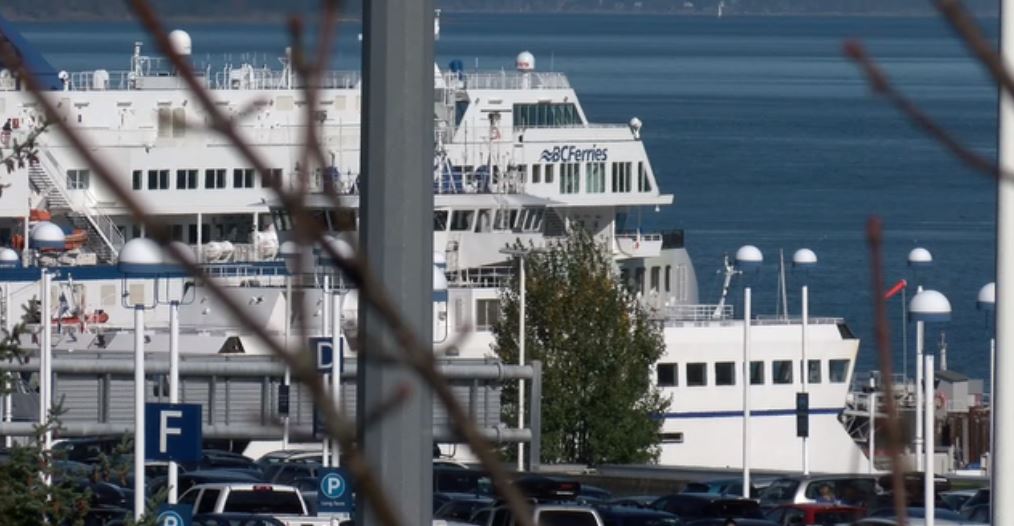
BC Ferries says it has enhanced cleaning routines on its vessels and at its terminals as the number of coronavirus cases continues to grow in Canada.
The company said as a precaution, crews at terminals and onboard the vessels are “taking extra measures to clean all touchpoints.”
According to BC Ferries, there are enhanced cleaning routines in place and the timing of the routines have been adjusted. That means the cleaning may be more visible to passengers.
BC Ferries also said it is regularly monitoring information and direction from the BC Centre for Disease Control and the Public Health Agency of Canada regarding the coronavirus.
“We have standard procedures in place to mitigate the spread of illness on our ferries and at our terminals. Transport Canada regulations do not permit passengers to remain in the vehicles on an enclosed vehicle deck. BC Ferries is committed to providing a safe and healthy workplace for our employees and our customers,” a statement from BC Ferries said.
BC Transit, which operates 88 transit systems in 130 communities across British Columbia outside of Greater Vancouver said it is following the lead of Health Canada and the province of BC.
BC Transit said since the risk has been deemed low by health officials, BC Transit is continuing standard cleaning practices for its buses. Under the standard practices, when a bus returns back to the yard for the evening, it is cleaned. If required, BC Transit will do a detailed clean of a bus, the company said.
“Health experts advise the risk rating is still low, and we continue to monitor the situation along with our partners including Translink. Health experts recommend customers to reconsider travel plans if they are not feeling well, to follow proper hand hygiene practices including using hand sanitizer and handwashing practices, and to please cover their nose and mouth if they have to cough or sneeze,” BC Transit said in a statement.
“We are also reminding staff of the importance of practicing proper hand hygiene practices including using hand sanitizer and handwashing practices and to please cover their mouth if you have to cough or nose if they have to sneeze. If the situation changes, we would then explore if additional cleaning practices need to be implemented.”
There are 52 COVID-19 cases in Canada: 21 in B.C., 28 in Ontario, two in Alberta and one in Quebec.
In B.C., four cases have recovered, one is in the ICU at Vancouver General Hospital and the rest are in self-isolation. One of the cases is connected to travel from Seattle and one is the first apparent community transmission of the virus in the province.
On Friday, the B.C. government said it had activated its pandemic plan and was ready to escalate it if needed for COVID-19. The B.C. government also said it was still focused on containment.
Ontario’s Ministry of Health reported a total of 22 provincewide cases on Thursday morning, but confirmed Friday evening the figure had climbed to 28. Four of those cases have been resolved.
The latest two cases include a man in his 20s who returned from Italy on March 3 and went to Mount Sinai Hospital’s emergency department in Toronto. He was discharged home the same day where he remains in self-isolation.
The second is a Richmond Hill woman in her 60s returned from Iran on March 2.
Other recent cases include a Toronto man in his 50s who recently travelled to Iran and a Toronto resident who recently visited Las Vegas.
That man, who Toronto public health officials describe as in his 40s, also used city transit in Toronto for several days before he was tested for the virus.
The Alberta government announced Friday it is now dealing with a a second presumptive case of the novel coronavirus and is ramping up testing protocols.
Dr. Deena Hinshaw, chief medical officer of health, announced Friday a new presumptive case of the virus – a man in his 40s in the Edmonton area who had recently travelled on business to Michigan, Illinois and Ohio.
She said the man returned to Alberta on Feb. 28 and is currently isolated at his home. Officials are still gathering information on what the man has been doing and who has seen since getting back a week ago.
The first presumptive case in Alberta is a woman in her 50s who appeared to have contracted COVID-19 while on board a Grand Princess cruise ship that is now being held for testing off the coast of California.
In Quebec, the first presumptive case is a man who recently returned from India and the second is a woman who recently returned from France.
COVID-19 information from Public Health Agency of Canada can be found here.
With files from The Canadian Press




